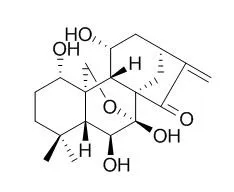| In vitro: |
| PLoS One. 2014 Oct 21;9(10):e109951. | | Effusanin E suppresses nasopharyngeal carcinoma cell growth by inhibiting NF-κB and COX-2 signaling.[Pubmed: 25333664] | Rabdosia serra is well known for its antibacterial, anti-inflammatory and antitumor activities, but no information has been available for the active compounds derived from this plant in inhibiting human nasopharyngeal carcinoma (NPC) cell growth.
METHODS AND RESULTS:
In this study, we isolated and purified a natural diterpenoid from Rabdosia serra and identified its chemical structure as Effusanin E and elucidated its underlying mechanism of action in inhibiting NPC cell growth. Effusanin E significantly inhibited cell proliferation and induced apoptosis in NPC cells. Effusanin E also induced the cleavage of PARP, caspase-3 and -9 proteins and inhibited the nuclear translocation of p65 NF-κB proteins. Moreover, Effusanin E abrogated the binding of NF-κB to the COX-2 promoter, thereby inhibiting the expression and promoter activity of COX-2. Pretreatment with a COX-2 or NF-κB-selective inhibitor (celecoxib or ammonium pyrrolidinedithiocarbamate) had an additive effect on the Effusanin E-mediated inhibition of proliferation, while pretreatment with an activator of NF-κB/COX-2 (lipopolysaccharides) abrogated the Effusanin E-mediated inhibition of proliferation. Effusanin E also significantly suppressed tumor growth in a xenograft mouse model without obvious toxicity, furthermore, the expression of p50 NF-κB and COX-2 were down-regulated in the tumors of nude mice.
CONCLUSIONS:
These data suggest that Effusanin E suppresses p50/p65 proteins to down-regulate COX-2 expression, thereby inhibiting NPC cell growth. Our findings provide new insights into exploring Effusanin E as a potential therapeutic compound for the treatment of human nasopharyngeal carcinoma. | | Food Chem. 2013 Aug 15;139(1-4):902-9. | | Antibacterial activity-guided purification and identification of a novel C-20 oxygenated ent-kaurane from Rabdosia serra (MAXIM.) HARA.[Pubmed: 23561188 ] | The objective of this work was to conduct an activity-guided isolation of antibacterial compounds from Rabdosia serra.
METHODS AND RESULTS:
The ethanol extracts of R. serra leaf and stem were partitioned sequentially into petroleum ether, ethyl acetate, butanol and water fractions, respectively. The ethanol extract of leaf evidenced broad-spectrum antibacterial activity against gram-positive bacterial, including Bacillus subtilis, Bacillus cereus, Staphylococcus aureus, and Listeria monocytogenes. The ethyl acetate fractions of leaf and stem exhibited strong inhibition against gram-positive bacteria, and were then purified further. On the basis of antibacterial assay-guided purification, three phenolic compounds (rosmarinic acid, methyl rosmarinate and pedalitin) and four C-20 oxygenated ent-kauranes (Effusanin E, lasiodin, rabdosichuanin D and a new compound namely effusanin F) were obtained, whose contents were determined by HPLC analysis.
CONCLUSIONS:
The broth microdilution method confirmed the important inhibition potential of C-20 oxygenated ent-kauranes with low minimum inhibitory concentration (MIC) values. Effusanin E, lasiodin and effusanin F could be useful for the development of new antibacterial agents. |
|






 Cell. 2018 Jan 11;172(1-2):249-261.e12. doi: 10.1016/j.cell.2017.12.019.IF=36.216(2019)
Cell. 2018 Jan 11;172(1-2):249-261.e12. doi: 10.1016/j.cell.2017.12.019.IF=36.216(2019) Cell Metab. 2020 Mar 3;31(3):534-548.e5. doi: 10.1016/j.cmet.2020.01.002.IF=22.415(2019)
Cell Metab. 2020 Mar 3;31(3):534-548.e5. doi: 10.1016/j.cmet.2020.01.002.IF=22.415(2019) Mol Cell. 2017 Nov 16;68(4):673-685.e6. doi: 10.1016/j.molcel.2017.10.022.IF=14.548(2019)
Mol Cell. 2017 Nov 16;68(4):673-685.e6. doi: 10.1016/j.molcel.2017.10.022.IF=14.548(2019)